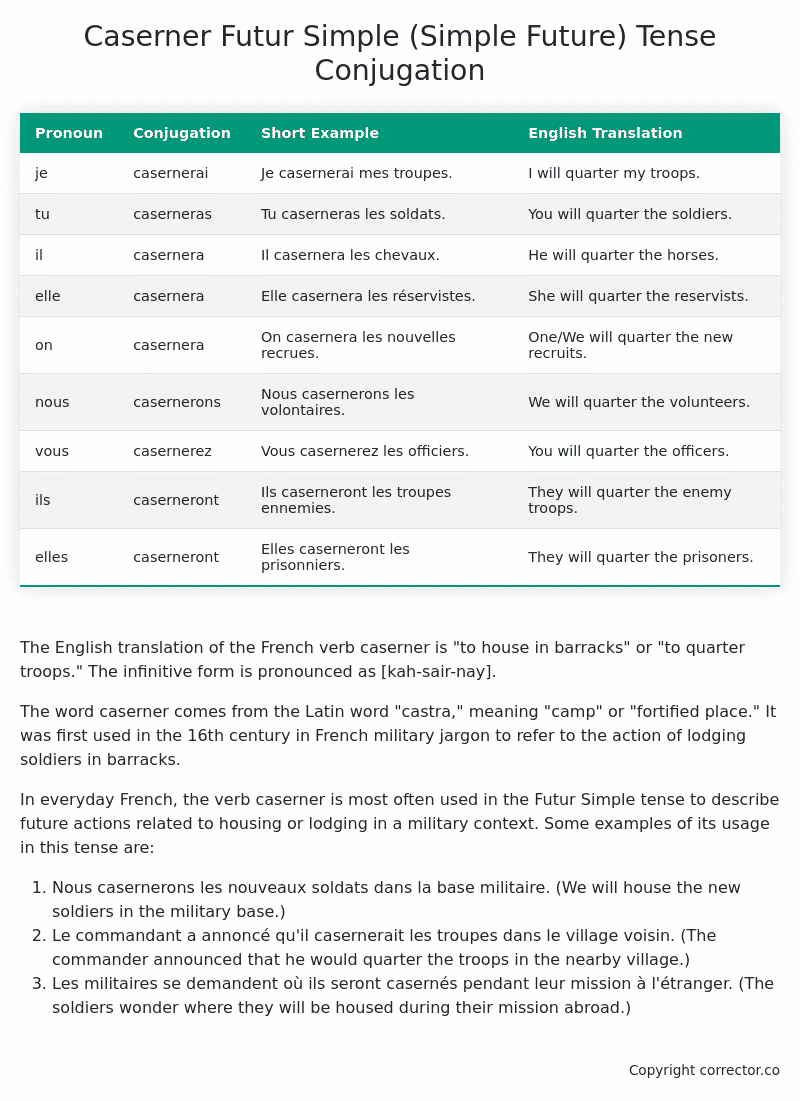Futur Simple (Simple Future) Tense Conjugation of the French Verb caserner
Introduction to the verb caserner
The English translation of the French verb caserner is “to house in barracks” or “to quarter troops.” The infinitive form is pronounced as [kah-sair-nay].
The word caserner comes from the Latin word “castra,” meaning “camp” or “fortified place.” It was first used in the 16th century in French military jargon to refer to the action of lodging soldiers in barracks.
In everyday French, the verb caserner is most often used in the Futur Simple tense to describe future actions related to housing or lodging in a military context. Some examples of its usage in this tense are:
- Nous casernerons les nouveaux soldats dans la base militaire. (We will house the new soldiers in the military base.)
- Le commandant a annoncé qu’il casernerait les troupes dans le village voisin. (The commander announced that he would quarter the troops in the nearby village.)
- Les militaires se demandent où ils seront casernés pendant leur mission à l’étranger. (The soldiers wonder where they will be housed during their mission abroad.)
Table of the Futur Simple (Simple Future) Tense Conjugation of caserner
| Pronoun | Conjugation | Short Example | English Translation |
|---|---|---|---|
| je | casernerai | Je casernerai mes troupes. | I will quarter my troops. |
| tu | caserneras | Tu caserneras les soldats. | You will quarter the soldiers. |
| il | casernera | Il casernera les chevaux. | He will quarter the horses. |
| elle | casernera | Elle casernera les réservistes. | She will quarter the reservists. |
| on | casernera | On casernera les nouvelles recrues. | One/We will quarter the new recruits. |
| nous | casernerons | Nous casernerons les volontaires. | We will quarter the volunteers. |
| vous | casernerez | Vous casernerez les officiers. | You will quarter the officers. |
| ils | caserneront | Ils caserneront les troupes ennemies. | They will quarter the enemy troops. |
| elles | caserneront | Elles caserneront les prisonniers. | They will quarter the prisoners. |
Other Conjugations for Caserner.
Le Present (Present Tense) Conjugation of the French Verb caserner
Imparfait (Imperfect) Tense Conjugation of the French Verb caserner
Passé Simple (Simple Past) Tense Conjugation of the French Verb caserner
Passé Composé (Present Perfect) Tense Conjugation of the French Verb caserner
Futur Simple (Simple Future) Tense Conjugation of the French Verb caserner (this article)
Futur Proche (Near Future) Tense Conjugation of the French Verb caserner
Plus-que-parfait (Pluperfect) Tense Conjugation of the French Verb caserner
Passé Antérieur (Past Anterior) Tense Conjugation of the French Verb caserner
Futur Antérieur (Future Anterior) Tense Conjugation of the French Verb caserner
Subjonctif Présent (Subjunctive Present) Tense Conjugation of the French Verb caserner
Subjonctif Passé (Subjunctive Past) Tense Conjugation of the French Verb caserner
Subjonctif Imparfait (Subjunctive Imperfect) Tense Conjugation of the French Verb caserner
Subjonctif Plus-que-parfait (Subjunctive Pluperfect) Tense Conjugation of the French Verb caserner
Conditionnel Présent (Conditional Present) Tense Conjugation of the French Verb caserner
Conditionnel Passé (Conditional Past) Tense Conjugation of the French Verb caserner
L’impératif Présent (Imperative Present) Tense Conjugation of the French Verb caserner
L’infinitif Présent (Infinitive Present) Tense Conjugation of the French Verb caserner
Struggling with French verbs or the language in general? Why not use our free French Grammar Checker – no registration required!
Get a FREE Download Study Sheet of this Conjugation 🔥
Simply right click the image below, click “save image” and get your free reference for the caserner Futur Simple tense conjugation!

Caserner – About the French Futur Simple (Simple Future) Tense
Formation of Futur Simple
For regular -er verbs (e.g., parler – to speak)
For regular -ir verbs (e.g., finir – to finish)
For regular -re verbs (e.g., vendre – to sell)
Common Everyday Usage Patterns
Conditional Statements
Interactions with Other Tenses
Futur Antérieur
Conditional
Present
Summary
I hope you enjoyed this article on the verb caserner. Still in a learning mood? Check out another TOTALLY random French verb conjugation!


